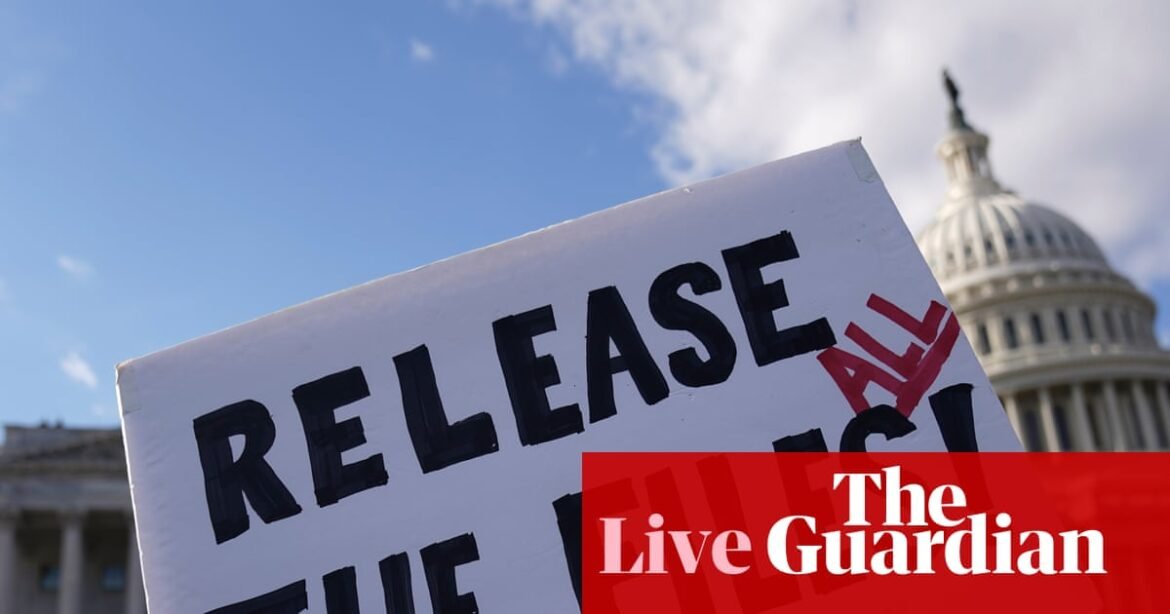Key events
Trump signs funding bill to end longest US government shutdown
Chris Stein
The longest US government shutdown in history ended on Wednesday after more than 42 days, following the House of Representative’s passage of a bill negotiated by Republicans and a splinter group of Democrat-aligned senators.
The compromise sets the stage for government operations to return to normal through January, while leaving unresolved the issue of expiring tax credits for Affordable Care Actor Obamacare health plans, which most Democrats demanded be extended in any deal to reopen the government.
After it was unveiled over the weekend, the Senate approved the compromise on Monday, and the House followed suit two days later by a margin of 222 in favor and 209 against, with two not voting. Donald Trump signed the bill on Wednesday night, saying “we’re sending a clear message that we will never give in to extortion, because that’s what it was … the Democrats tried to extort our country”.
Six Democrats broke with their party to vote for the bill: Adam Gray of California, Tom Suozzi of New York, Marie Gluesenkamp Perez of Washington, Don Davis of North Carolina, Henry Cuellar of Texas and Jared Golden of Maine. Two Republicans, Thomas Massie of Kentucky and Greg Steube of Floridavoted against it.
House Republican leadership said in a statement:
The Democrat shutdown is finally over thanks to House and Senate Republicans.
There is absolutely no question now that Democrats are responsible for millions of American families going hungry, millions of travelers left stranded in airports, and our troops left wondering if they would receive their next paycheck.
In remarks on the House floor shortly before the vote, the Democratic minority leader Hakeem Jeffries had pledged to continue to press for the subsidies’ extensions.
He said:
This fight is not over. We’re just getting started.
Either Republicans finally decide to extend the Affordable Care Act tax credits this year, or the American people will throw Republicans out of their jobs next year and end the speakership of Donald J Trump once and for all. That’s how this fight ends.
The spending standoff was the biggest battle between congressional Democrats and Republicans since Trump returned to the White House earlier this year. It resulted in unprecedented disruptions to government services, with the Trump administration ordering cuts to commercial air travel across the country, and the first-ever halt to the largest federal food aid program.
Mike Johnsonthe US House speaker, said on Wednesday he would put the bill compelling the release of government files related to late sex offender Jeffrey Epstein on the House floor next week.
“We are gonna put that on the floor for [a] full vote next week, [as] soon as we get back,” Johnson told reporters, as the chamber gathered to debate legislation to reopen the government.
Johnson, who opposes the bill, made the announcement just hours after swearing in Arizona Democrat Adelita Grijalvawho took her oath of office seven weeks after she won a late September special election to succeed her father, the longtime representative Raul Grijalvawho died in March.
Grijalva’s swearing-in cleared the path for the vote to release the Epstein filesas she became the 218th and final signature on a discharge petition that automatically triggers a House floor vote on legislation demanding the justice department release the files. In her floor remarks on Wednesday, Grijalva said:
Justice cannot wait another day. Adelante.
Under the rules governing discharge petitions, Johnson would not have been mandated to require a vote until early December, so his announcement that the vote would take place next week is earlier than expected.
Even if the bill passes the House, it still needs to get through the Senate and be signed by Trump. Senate leaders have shown no indication they will bring it up for a vote, and Trump has decried the effort as a “Democrat hoax”.
More on this story in a moment, but first here are some other key developments in US politics:
-
A tranche of documents released by the House oversight committee on Wednesday revealed that Jeffrey Epstein’s staff kept him apprised of Donald Trump’s air travel as it related to his own transportation – and that the late sex trafficker kept up with news about his former friend years after their relationship soured. This disclosure of about 20,000 pages from Republican members of the committee related to Epstein comes as Trump continues to battle with the political fallout related to their past friendship – and his justice department’s failure to release documents as he had long promised on the campaign trail.
-
The US House of Representatives voted to pass the funding bill to end the longest government shutdown in US history. Trump signed the bill into law on Wednesday night. The legislation comes in the wake of a Senate-brokered compromise in which a handful of Democrats voted to forego the extension of expiring healthcare subsidies, which have been at the heart of the long impasse.
-
Trump has said he feels he has “an obligation” to sue the BBC over its editing of one of his speeches, as a deadline looms for the corporation to respond to his billion-dollar legal threat. The US president accused the broadcaster of having “defrauded the public” with an edition of Panorama last year that spliced together two parts of a speech he made on 6 January 2021 and has given it until Friday to respond.
-
Trump has repeated a request to Israel’s president, Isaac Herzog, for a pardon for Benjamin Netanyahu, who is on trial in three separate corruption cases. The Israeli prime minister has repeatedly denied any wrongdoing in the ongoing court cases. No rulings have been delivered, and his supporters have dismissed the trials as politically motivated.

